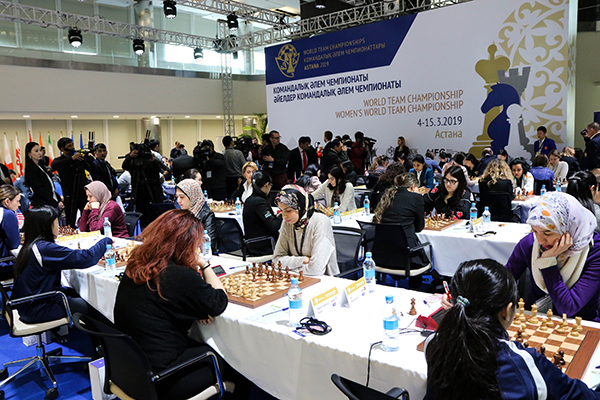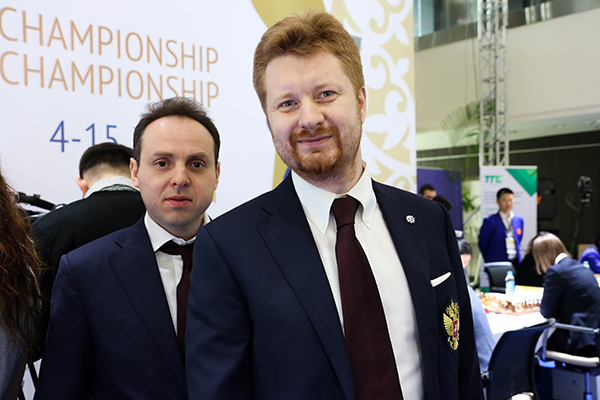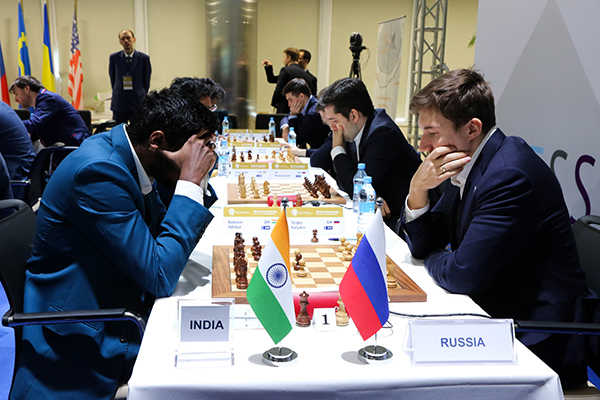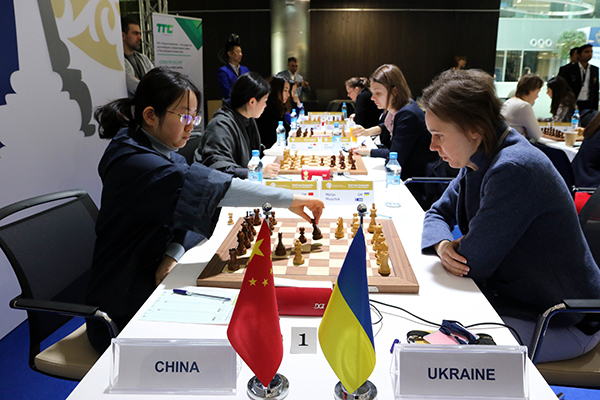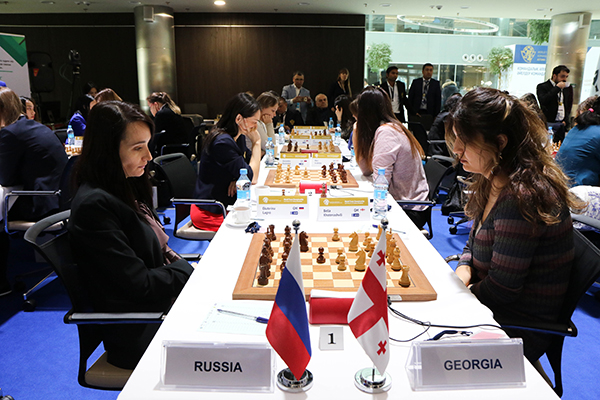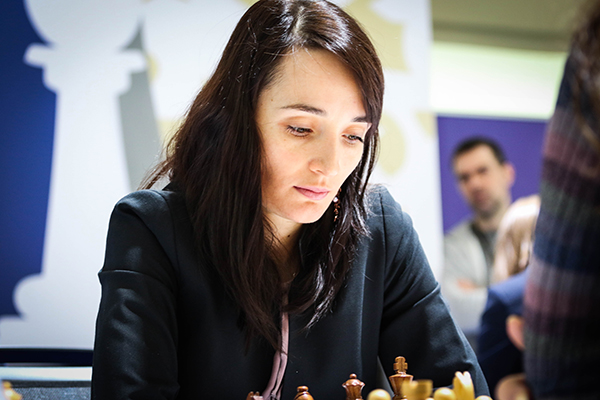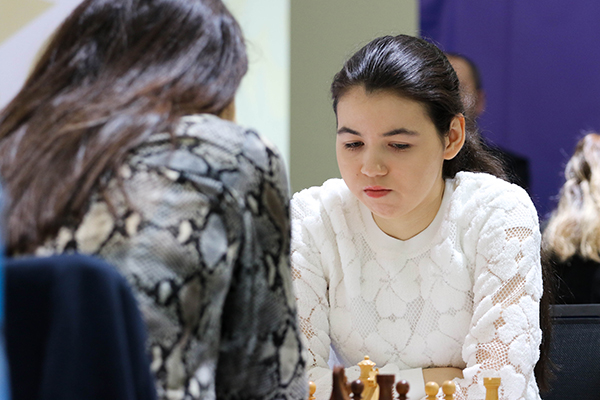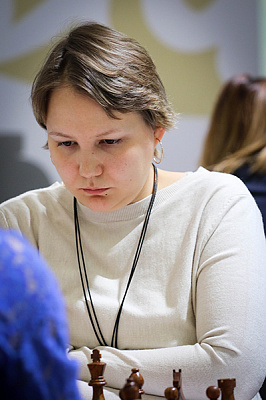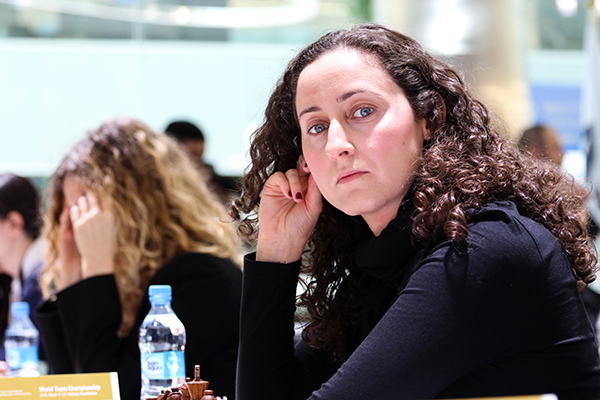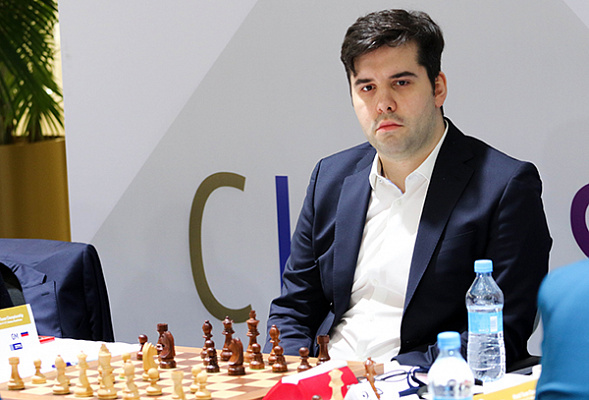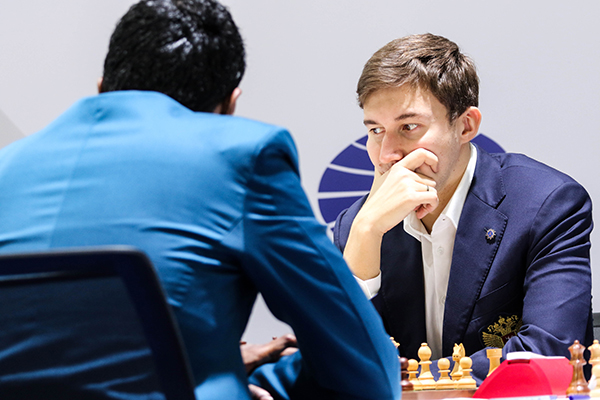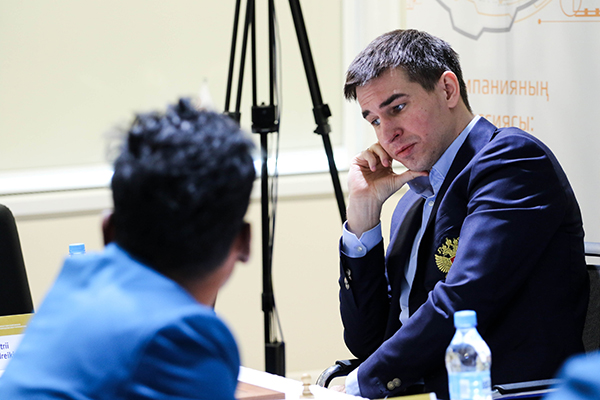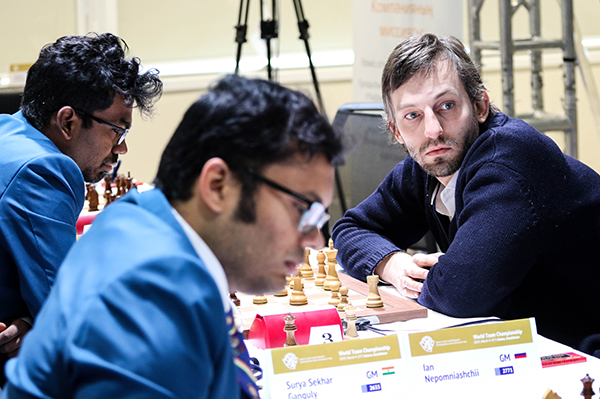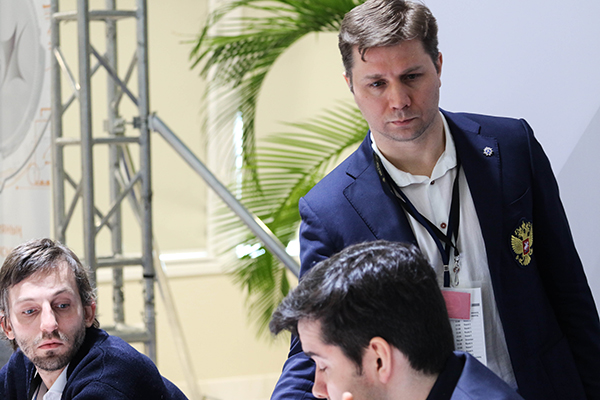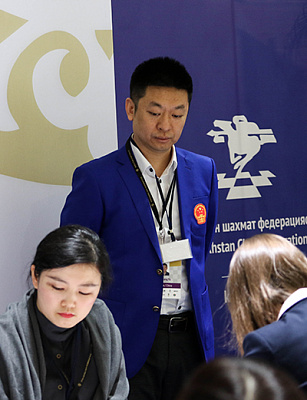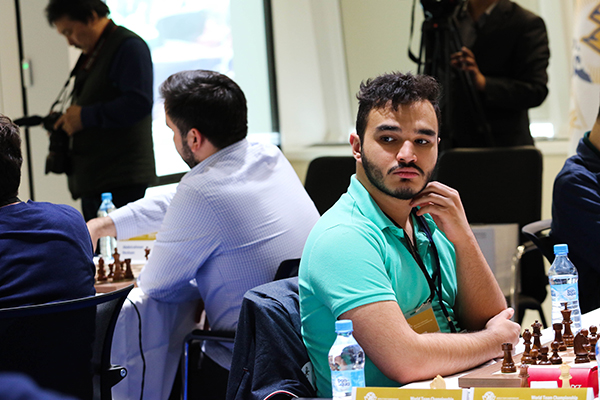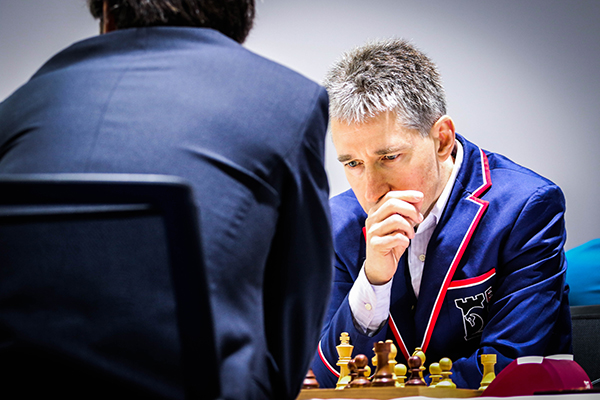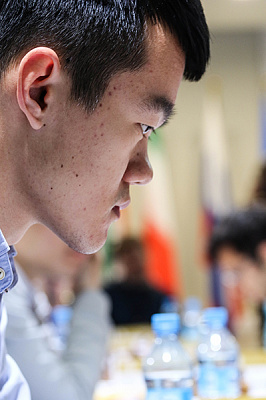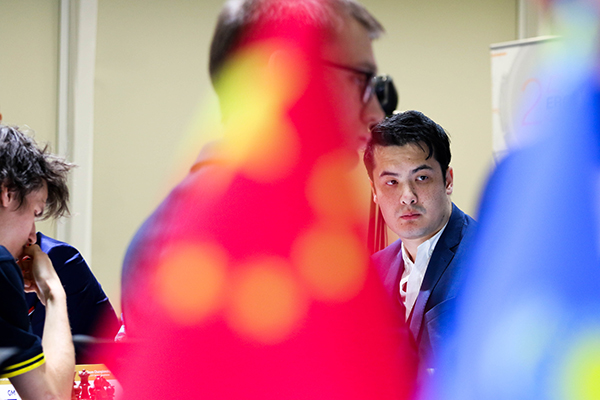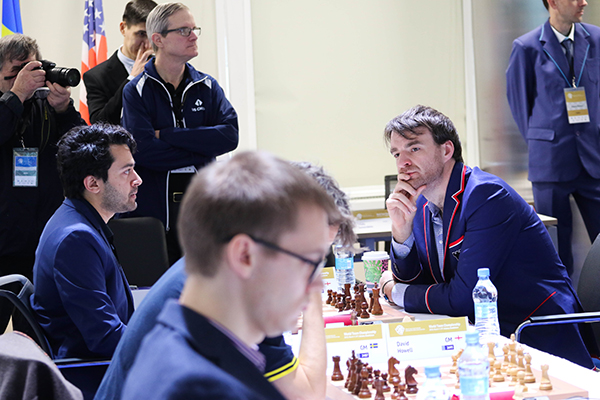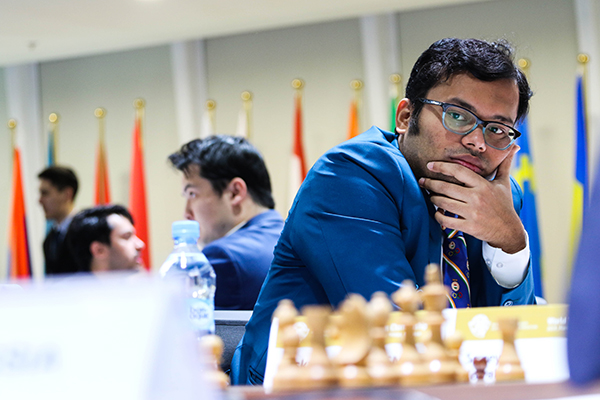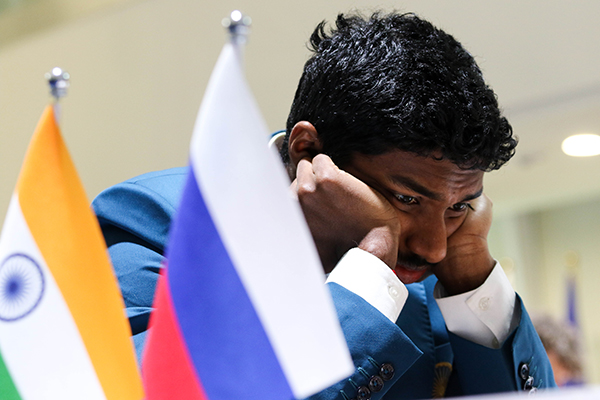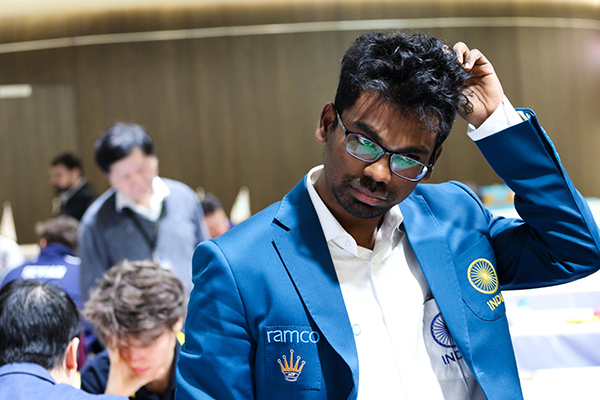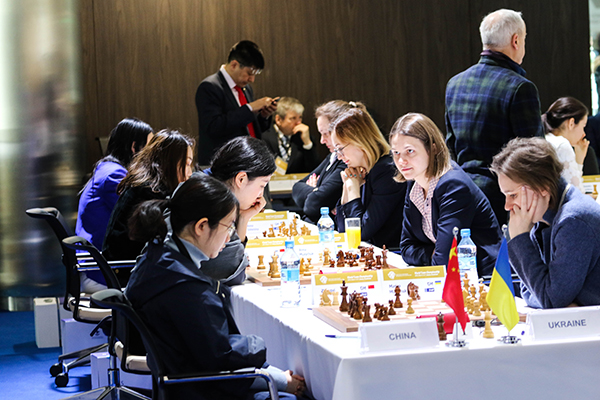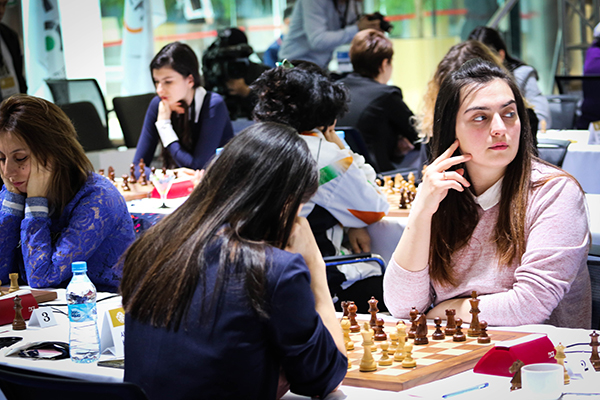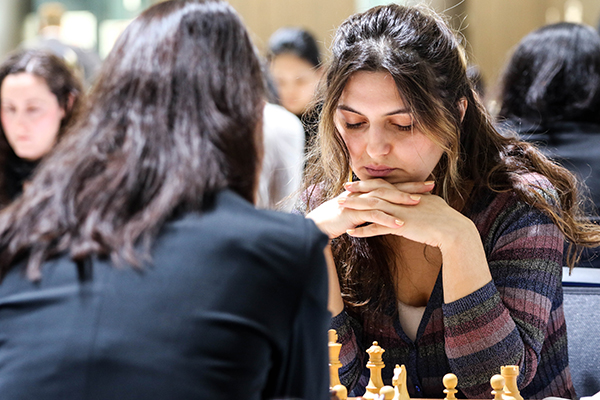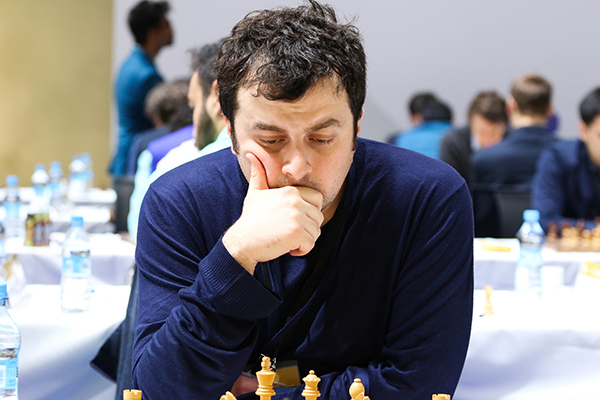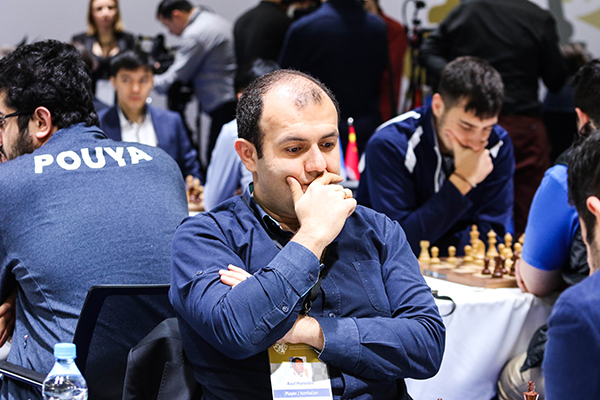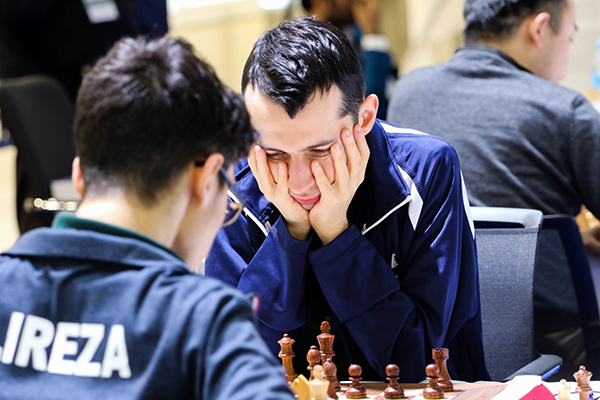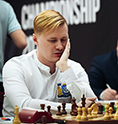Staying Motivated Whatever
Eteri Kublashvili reports on the final round of the World Team Championships.
The ultimate round of any event taking place in the morning is usually the most exhausting one. As we know already, the fate of gold medals was sealed with one round to go, but other medals had no shortage of contenders.
Although team Russia ended up outperforming team India, the course of the match was anything but a walk in the park for the champions. Ian Nepomniachtchi handled the opening in a reckless style and emerged down a piece against Ganguly, but his tenacious defense led to a draw. Dmitry Andreikin was having hard time fending off Aravindh’s offensive and could have run into substantial difficulties while doing that. Playing White on board one, Sergey Karjakin got a definite edge against Adhiban, but the latter managed to draw the game. However, winning on board three was Alexander Grischuk in what turned out to be the longest game of the match.
At the closing press conference Alexander shared about three items boosting his motivation to persist in his battle with Sethuraman that had shown up before and during the game
– First of all, Sergey Karjakin had informed me that our team would have taken first even with his going down in all tournament games provided that Russia ended up 2.5:0.5 over India at boards 2-4. The score we had with India was never that high, which means only clinching into the share of first in the hypothetical case voiced by Karjakin.
Secondly, I am happy to have helped out team China and especially my friend Ni Hua, my teammate from the Chinese League’s Shanghai Tigers.
Besides, my third motivator was my opponent's baseless offering a draw in a pawn down endgame I view it as disrespect for chess in the first place. Having respect for me is not a must, but it would be a good idea to have it for chess.
The Russian team has been undefeated and ended up scoring 16 match points.
England defeated Sweden 3.5:0.5 to take clear second with 13 match points. It was a narrow victory for China over Kazakhstan, which landed them third with 12 match points.
Final tournament standings:
1. Russia - 16; 2. England - 13; 3. China - 12; 4-5. India, USA - 11; 6-7. Iran, Azerbaijan - 8; 8-9. Kazakhstan, Sweden - 4; 10. Egypt - 3.
The Russian men’s team performance is summed up by its coach and captain Alexander Motylev.
– Alexander, my victory congratulations to you and your team! Did you anticipate the scenario of winning ahead of time?
–Thank you for congratulations! Men’s triumph at the world championship goes back to 2013, this is why you have to treat any such anticipations cautiously. Going into round eight, we were, of course, going over our pursuers’ games and were aware of various potential scenarios. There was virtually nothing that depended on us, we just needed to outperform Sweden. However, it happened so that our pursuers ended up dropping match points and we did not.
I fail to recall the last time winning with one round to go. We have steadily made it into the top three in almost all tournaments, finishing third at the latest two Olympiads, sharing 1-2 places at the European Championship, but having bad luck with the tie-breakers. Two years ago we finished second at the Team World Championships behind the Chinese - back then we had tie-breakers playing into our hands, but came up short of points. Despite steady performance, we did want to take gold at last.
– What has contributed to the current success?
– We have a renewed lineup in the first place. First-timers have lived up to expectations. Dmitry Andreikin has participated once at the European Championship, and his performance at this championship has been very decent and solid. And, of course, Vlad’s superb performance points to his being in the zone. We decided to invite him on the team even before his Gibraltar triumph, and how he is simply in great shape, coupled with his zest of youth, no lack of confidence and a desire to create over the board. His contribution into the victory cannot be stressed enough.
It goes without saying that it was of paramount importance to win a key matchup from our main competitors China. We lost a match to China last year over one game going badly for us. This time, however, we managed to come up with an interesting opening preparation together with Ian, which he successfully employed against Yu Yangyi to bring the point home. It should be added that it has been long since we defeated this team. This loss was an upset for China, which had also lost their match the day before. The tournament went astray for them afterwards. It was the opposite for us, needless to say.
– What is your take on our other three players’ performance?
– Sergey started on a good note, but it is hard to say what went wrong afterwards. He seems not in the best of shape. He suffered bitter defeats over a minute loss of concentration. It was perhaps due to his not coping with tension towards the end of the game, and we had to substitute him for that reason. Still, what mattered most was that the team kept on winning.
Ian’s performance is always commendable, him being our team’s powerhouse. He had some health issues during the competition, but that did not stand in his way of bringing vital points to the team.
Alexander Grischuk is a seasoned team player, and I am very happy about the way he delivered here. I do like his approach, and young players also look up to him to follow in his footsteps.
– Are you happy about the team togetherness?
– I believe it was ideal, but we’d better ask the players. On the other hand, team togetherness means little in the face of underwhelming play and lack of results. All in all, we have had no major issues standing in our team’s way. It has been a lucky mix of youth and experience. In my opinion, a team is always in need of a young player with a fresh look on things, energy and desire to win.
– Does Vladimir Kramnik’s absence have any impact on the team?
– Being a profound professional, Vladimir's performance has always lived up to expectations, manifesting itself in a consistent play and many points for his team. I do hope he is going to think again and return to big chess. It is not apparent that he would have played for the team in Astana because we had missed him at certain championships. This said, we could take more young players on team. It is a win-win situation – Kramnik is always a huge asset for the team, and the current lineup is a pleasure to look at as well.
– What about the event’s organization?
– We tried to do our best in terms of playing chess, and organizers were doing the same in terms of managing the event. They were ready to meet us halfway, as they say. The playhall is somewhat small, and it felt stuffy in the beginning, but then the latter improved. All in all, they managed well and we have nothing to complain about.
– From your point of view, what is the reason of China's underwhelming performance? Their lineup seems to miss no strong players.
– Their lineup is very strong indeed. Besides, Bu is in great shape, his current rating being 2730, which is a significant zoom from his recent below 2700 level. Going into the matchup with China, I had a feeling that our victory might likely be a turning point from which things would no longer go well for China. It was exactly the case. Nevertheless, it is hard to say what went wrong for team China since Ding's performance at board one was superb.
– Which team or player have you been pleasantly surprised with?
– Although not rated high, Kazakhstan men’s decent performance was quite a surprise. Playing home is often a challenge, but they gave a decent display and seem to have even underscored somewhat in certain matches. Russia vs Kazakhstan was a gruelling match, with all games lasting long and remaining unclear until the very end.
You cannot but rejoice with the success of team Iran. Their team is young, shining in which is Firouzja. He has simply torn board four apart. By the way, in that important match with Iran of round one Vlad was the only one managing to outplay Alireza. I thought Iran capable of fighting for one of the medal places, but lack of experience told in the end.
– Did you receive many congratulations on the ahead-of-time victory? Is it of interest to mass media?
– We did receive many calls immediately. Andrey Filatov, senior coach of our team, was taking everything to heart and would often call us, congratulating us immediately after it became known. He could not make it here this time because of his newly-born daughter. Friends and close people are congratulating us, and we have also had many phone calls from mass media people. This amount of phone calls is a real challenge to cope with! (laughing).
Women’s team China defeated Ukraine 3.5:0.5 and took the world championship gold with a perfect score.
Russia drew Georgia to take second with 14 match points. Georgia ended up taking bronze with 12 match points, overtaking team Ukraine due to better tie-breakers.
Final tournament standings:
1. China - 18; 2. Russia - 14; 3. Georgia - 12 (23); 4. Ukraine - 12 (20.5); 5. Kazakhstan - 10; 6. India - 9; 7. USA - 7; 8-9. Armenia, Hungary- 4; 10. Egypt - 0.
Sergey Rublevsky on the closing match with team Georgia and overall performance of the Russian women’s team:
– The match started on a very good note for us, and I thought we were better at all boards after some two or two and a half hours of play. Alexandra Kosteniuk’s position was hard to evaluate, but both Valentina Gunina and Kateryna Lagno were up a pawn and with excellent winning chances. I wish we had converted this edge. Kudos to the Georgian players, who were defending well at their black boards.
In general, our team's performance cannot be assessed as a success because our lineup was optimal and we could have achieved more taking into account the lack of world champion on the Chinese team. By placing Aleksandra Goryachkina on board four we counted on her to become our team's main scorer, which she actually did. She was superb in all nine games. The impression was such that she was only gearing up towards the end of the tournament and was tired not in the least!
Unfortunately, we failed to take any of the key matchups, which frustrated me a lot. We did want to win in style, but failed, and deservedly so, I would say. Strange as it may sound, we managed to win key matchups in previous events, but it was not the case in this event. It rings alarm bells with me. This lack of penetrating power is apparently due our leaders’ being in good shape in the preceding period of individual competitions and training camps, but spending too much energy along the way and lacking it here. We tried to give them as much rest time as possible, but it seems not enough.
We were gaining more individual points than China up to a certain moment. It looked as if the Chinese women were having hard time winning their matches. They defeated us a lot more confidently than, say, doing same over Georgia or Kazakhstan. Following this defeat we readjusted to fighting for the second place since the Chinese’s home stretch was slightly easier than ours. We ended up taking second by a wide margin.
From the quality point of view, I would like to highlight the matchup with Ukraine, in which all our players were playing great chess up to midpoints of their games. Then we let our chances go (Girya could have scored), but it is unlikely to have affected the overall standings. It was a good match.
The closing ceremony went off in a relaxed manner. Speeches and giving out of awards were interspersed with musical and dance numbers. Some teams had already left, and the Chinese players started heading to the airport immediately after the teams’ awards, without waiting for giving out of individual ones at each board.
Vladislav Artemiev is on the brink of becoming a meme. Having been awarded for his first place among reserve players, he would not leave the stage and spend more time there while best reserve players among women and board four winners were being awarded. It turned out later that vice-president of the Kazakhstan Chess Federation Zhandos Abishev would not let Vlad leave the stage to share with others about our chess player having grown up not far from Astana and, therefore, the Kazakh people viewing him as their countryman.
Well, ladies and gentlemen, the world championship is over. We congratulate our teams and all Russian fans on gold and silver medals and wish all of you further success!












